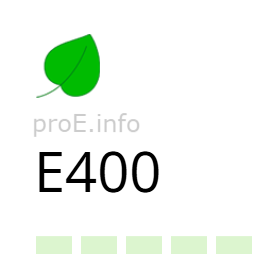
Other names for the additive (synonyms)
General Information
Alginic acid (food additive E400) is a natural polysaccharide extracted from brown algae. It is the main component of the cell walls of laminaria, fucus, macrocystis and other species of seaweeds.
In industry, alginic acid is obtained from the same sources as its salts (alginates): raw materials are harvested in the coastal areas of Japan, China, Chile, France, Norway, the USA and Russia.
From a chemical point of view, alginic acid is a linear copolymer consisting of residues of D-mannuronic and L-guluronic acids linked by β-1,4-glycosidic bonds. Its empirical formula: (C6H8O6)n. Depending on the content of guluronic or mannuronic acid blocks, the properties of the compound may vary.
In its pure form, additive E400 appears as a cream or light brown powder. Alginic acid is poorly soluble in water but is able to swell and form viscous colloidal systems. When interacting with calcium ions and other divalent cations, it forms dense gels. On its basis, salts are created – alginates: sodium alginate (E401), potassium alginate (E402), ammonium alginate (E403) and calcium alginate (E404).
Effects on the Body
Benefits of Additive E400
Alginic acid and its salts are known as powerful enterosorbents. They bind and remove radionuclides and heavy metals, which has been confirmed by numerous studies. These properties were especially actively studied in the 1970s–1980s in the USSR and Japan due to increased radiation exposure.
Several clinical trials have shown that alginic acid can lower cholesterol levels and normalize lipid metabolism. Experiments on animals and humans demonstrated that regular intake of alginates reduces triglyceride levels and improves the lipoprotein ratio.
One of the most well-known medical applications of alginic acid is related to the treatment of gastroesophageal reflux disease (GERD). Based on sodium alginate and alginic acid, drugs are created that form the so-called “alginate raft” on the surface of stomach contents. It prevents acid reflux into the esophagus and reduces heartburn symptoms.
Alginic acid is also used for wound and burn healing. Its gel-forming properties make it possible to create dressings that retain moisture and stimulate tissue regeneration. In dermatology and cosmetology, alginate masks based on alginic acid are well known for their moisturizing and firming properties.
Risks of Additive E400
In general, alginic acid is considered a safe substance. Toxicological studies have shown that even at very high doses (several grams per kg of body weight) no serious adverse effects were identified.
However, excessive intake may cause minor side effects in humans: laxative effect, increased gas formation, a feeling of heaviness in the intestines. In addition, due to its sorption properties, alginic acid can reduce the absorption of certain trace elements, such as calcium, iron and zinc.
In patients with chronic gastrointestinal diseases (irritable bowel syndrome, colitis) excessive doses of additive E400 may sometimes increase discomfort, although within technological usage levels these effects are very rare.
According to JECFA (FAO/WHO), alginic acid and its salts are recognized as safe. The acceptable daily intake (ADI) is set at up to 50 mg/kg of body weight. EFSA in its re-evaluation in 2017 confirmed that for the current levels of use of additive E400 there is no risk to human health.
Uses
In the food industry, alginic acid is used as a thickener, stabilizer and gelling agent. Additive E400 is used in the production of marmalade, candies, jams, jellies, sauces, mayonnaise and ice cream. It improves the viscosity of products and helps retain moisture.
In the meat and fish industry, additive E400 is used to improve the texture of products and increase the yield of finished goods. In beverages – to create turbidity or stabilize suspensions. In baking, alginic acid can slow staling and improve dough structure.
Beyond the food sector, alginic acid is used:
- in medicine – for the production of dressings, enterosorbents, anti-reflux agents;
- in pharmacology – as a stabilizer of suspensions and tablets;
- in cosmetics – as a base for alginate masks and emulsions;
- in biotechnology – as a matrix for cell and enzyme immobilization.
Legal status
Food additive E400 is permitted for use in most countries of the world. In the European Union its use is regulated by Regulation (EC) No 1333/2008.
In the USA, FDA classifies alginic acid as a GRAS substance (Generally Recognized As Safe). JECFA has established an ADI of 50 mg/kg of body weight. In Canada, Japan, Ukraine and CIS countries additive E400 is also officially permitted.